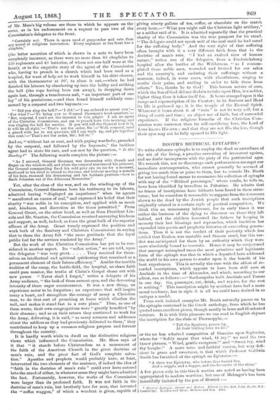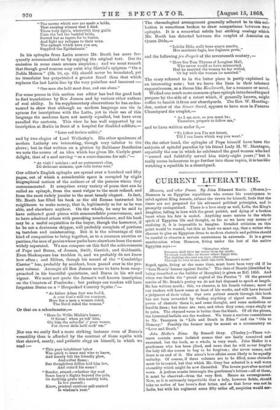BOOTH'S METRICAL EPITAPHS.*
To write elaborate epitaphs is to employ the dead as custodians of the wit of the living, a practice savouring of irreverent egoism, and no doubt incongruous with the piety of the patriarchal ages. We remark this, not to discourage such performances amongst our immediate contemporaries, who cannot generally be accused of giving too much time or pains to them, but to console Mr. Booth for not having found means to commence his collection of epitaphs with any of the "Biblical personages," whose tombs, be tells us, have been identified by travellers in l'alestine. He admits that no traces of inscriptions have hitherto been found in these struc- tures; but he considers it reasonable to suppose from the reverence shown to the dead by the Jewish people that such inscriptions originally existed in a certain style of poetical composition. We think this an unnecessary inference, for in early times it was rather the business of the dying to discourse on those they left behind, and the children honoured the fathers by keeping in memory their last blessings and reproaches, which tradition has expanded into poetic and prophetic histories of succeeding genera- tions. Thus it is not the verdict of their posterity which juts settled that Reuben was unstable and Sitneou cruel, but this ver- dict was anticipated for them by an authority which they were more absolutely bound to venerate. Hence it may be conjectured that amongst uninspired races the most primitive and legitimate form of the epitaph was that in which a departed hero addressed the world in his own person to confer upon it the benefit of his best experiences. This is actually the case with the oldest of re- corded inscriptions, which appears to have been still seen at Anchiale in the time of Alexander, and which, according to our editor, ran as follows :—" Sardauapalus built Anchiale and Tarsus in one day. Go, passenger, eat, drink, and rejoice, for the rest is nothing." This inscription might by accident have had a more moral tendency, but in style it is all we could have desired in so antique a model.
From such isolated examples Mr. Booth naturally passes on to the epitaphs contained in the Greek anthology, from which he has quoted some excellent pieces, though mostly in lame and ill-selected versions. It is with little pleasure we can read in English rhymes the inscription for the slain at Thermopylm,—
" Tell the Spartans, passer-by,
At their bidding here we lie ;" or the no less admired composition of Siminias upon Sophocles, where for "Softly mayst thou wind, 0 ivy !" we read the two tamer phrases, " Wind, gentle evergreen!" and "Sweet ivy, wind thy boughs !" A more terse and faithful version, but very defi- cient in grace and sweetness, is that which Professor Goldwin Smith has furnished of the epitaph on Epictetus:—
"A slave was Epictetus, who before thee buried lies,
And a cripple, and a beggar, and the favourite of the skies."
A few pieces only in this Greek section are noted as having been appropriated to modern worthies ; but one of Meleager's has been beautifully imitated by the pen of Herrick :—
• Metrical Epitaphs, Ancient and Modern. &Med by the Bev. John Booth, 13.A., Cambridge. London awl Eton: Bickers and Son. 1563.
"The morne which saw me made a bride, That evening witnest that I died. Those holy lights, wherewith they guide Unto the bed the bashful bride, Served but as tapers for to burne, And light my reliques to their urns. The epitaph which here you see, Supplied the Epithalarnie."
In his epitaphs from Latin sources Mr. Booth has more fre- quently accommodated us by copying the original text. But its omission in some cases arouses suspicion ; and we must remark that though good reasons may exist why Martial's epigram "On a Noble Matron" (lib. 10, ep. 63) should never be translated, yet no translator has perpetrated a greater fraud than that which replaces the last Latin line by the very pointless and innocent :— " One man she held most dear, and one alone."
For some poems in this section our editor has had the good luck to find translations by Ben Jonson and by various other authors of real ability. In his supplementary observations he has endea- voured to show that although no modern language can vie in aptness for inscriptions with the Latin, yet in their use of this language the moderns have not merely equalled, but have even excelled the ancients. This view he has well supported by an inscription at Berlin in front of a hospital for disabled soldiers,—
" Lame sod invicto multi ;"
and by two elegies of Lord Wellesley's. His other specimens of modern Latinity are interesting, though very inferior to the above ; but in that written on a glutton by Balthaser Bonifacius we note the source of an idea which has given Mr. Carlyle great delight, that of a soul serving "as a succalaneum for salt :"—
" At vixit ? minime ; sed no pntreseeret olim, Dii dederant animam, gum salis instar emt."
Our editor's English epitaphs are spread over a hundred and fifty pages, out of which a considerable space is occupied by slight biographical notices of the authors or of the persons whom they commemorated. It comprises every variety of poem that can be called an epitaph, from the most vulgar to the most refined, and from the most rudely jocular to the most tamely elegant. In fact, Mr. Booth has filled his book as the old Roman instructed his neighbours to make money, that is, legitimately as far as he was able, and elsewhere anyhow. On the whole, he may be said to have collected good -pieces with commendable perseverance, and to have admitted others with provoking nonchalance, and his book may be a useful acquisition to the buyer, though the borrower, if he be not a dexterous skipper, -will probably complain of portions art tasteless and uninteresting. But it is the advantage of this kind of composition to bring together, as to a common exercise or pastime, the men of genius whose paths have elsewhere been the most widely separated. We can compare on this field the achievements of Pope and Burns, of Jonson, Swift, Garrick, and Goldsmith. Even Shakespeare has trodden it, and we probably do not know how often ; and Milton, though his record of the "Cambridge Carrier" has, probably by accident, been passed over in the pre- sent volume. Amongst all Ben Jonson seems to have been unap- proached in his beautiful quaintness, and Burns in his wit and vigour. We must not quote the former's well known inscription on the Countess of Pembroke ; but perhaps our readers will have forgotten Burns on a "Henpecked Country Squire :"—
" As father Adam first was load,
A case that's still too common, Here lies a man a woman ruled, The Devil ruled the woman."
Or that on a schoolmaster,
" Here lie Willie Michie's banes ; 0 Satan! when ye tak' him,
Gie him the schoolin' o' your weans, For clever dells he'll mak' ern."
Nor can we easily find a more striking instance even of Burns's versatility than is afforded by the contrast of these squibs with that shrewd, manly, and pathetic elegy on himself, in which we read :—
" This poor inhabitant below Was quick to learn and wise to know, And keenly felt the friendly glow, And softer flame ; But thoughtless follies laid him low, And stain'd his name !
"Reader, attend—whether thy soul Soars fancy's flights beyond the pole, Or darkling grubs this earthly hole, In low pursuit ; Know, prudent cautious self-control Is wisdom's root."
The chronological arrangement generally adhered to in this col- lection is sometimes broken to draw comparisons between two epitaphs. It is a somewhat subtle but striking analogy which Mr. Booth has detected between the couplet of Ausonius on Queen Dido,—
" Infelix Dido, null bene nupta marito, Hoc moriente fagis, hoc fagiente ports," and the following jeu desprit of the seventeenth century,— " Here lies Tom Thyme of Longleat Hall, Who never would so have miscarried, Had he married the woman he lay withal, Or lay with the woman he married."
The story referred to in the latter piece is partly explained in
an interesting note ; but we leave the lines in their inherent suggestiveness, as a theme like Kenilworth, for a romance or novel.
We find one much more common-place epitaph in troducedtogood purpose by the side of a retort which, if generally known, might suffice to banish it from our churchyards. The Rev. W. Hunting- don, author of the Sinner Saved, appears to have seen in Pancras. Churchyard the couplet,— " As I am now, so you must be ; Therefore, prepare to follow me," and to have written under it,— " To follow you Pm not intent,
Till I can learn which way you want."
On the other hand, the epitaphs of Pope himself have been the
subjects of spiteful parodies by his friend Lady M. IV. Montague, especially the one in which he celebrated the good woman who had "nursed and faithfully served him thirty-eight years;" but it really seems indecorous to go further into these topics, it is too like watching a squabble in a churchyard.































 Previous page
Previous page